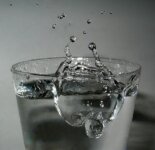
It’s probably no surprise to anyone that, as a science geek, it irks me when I see scientifically incorrect things in popular media (I have been known to yell at the TV during Mythbusters). But what really upsets me is when advertisers and marketing gurus try to use scientific terms and absurd claims to bamboozle people into buying their products.
The concepts of natural, chemical, organic, synthetic are thrown around a lot these days, not just in health and beauty, but also with household products and food. Here are a few of the phrases and claims that really annoy me:
“Chemical-free”

This is probably the worst one. Nothing can be “chemical-free”, unless it’s a vacuum. The reason is that everything made up of atoms is a chemical, whether solid, liquid or gas. A pristine, untouched flower in the middle of the Amazon is made up of thousands of chemicals. Not even an empty bottle would be chemical-free, since air is made up of chemicals (nitrogen, oxygen, carbon dioxide, water…). There’s an amusing collections of examples where “chemical-free” is used here.
What companies usually mean by “chemical-free” is that the product doesn’t contain synthetic or manufactured chemicals. But even that poses problems, since there’s no firm line between synthetic and natural defined by law, nor is there one in practice.
For example, is soap or petroleum jelly more natural? Soap is made by breaking down a usually naturally occuring fat or oil – in other words, the actual chemicals in it are artificially changed. Petroleum jelly is made from crude oil, dug up from the ground, and separated into its parts – the actual chemicals aren’t changed. But you’ll find the word “natural” attached to soap, but never to petroleum jelly!
“Natural is safer”
Not always… some of the most toxic substances known are from natural sources. Botulinum toxin, also known as botox, is produced by bacteria, and is the most toxic rapidly-killing poison known – killing poison known – 4 kilograms would be more than enough to kill everyone in the world. Ricin (from castor beans), tetanus (from bacteria) and pufferfish poison are also incredibly deadly.
One problem with using natural products is that usually natural extracts are a mixture of lots of different compounds. For example, manufactured vitamin C is only one compound – L-ascorbic acid. It looks like this:

But natural treatments such as echinacea can contain lots of different compounds, and depending on where and when the flower is grown, what it’s fertilised with, how it’s stored, and how it’s processed, the actual content of your echinacea pill can vary quite significantly, so you don’t really know how much of each active ingredient you’re taking. This isn’t a problem with manufactured chemicals like vitamin C.
“It’s what Nature intended”
This is always a weird claim, because if you think about it, Nature doesn’t really want us to live for a long time, let alone use cosmetics or skincare products! Living past the age of 30 is a relatively modern trend, which only really started in the 20th century, thanks to developing knowledge about hygiene, vaccinations and antibiotics.
This is not to say that all “natural” products are scams! There are often some real benefits to using “natural” products, such as a lower chance of certain harmful contaminants. But these benefits are usually buried in a confusing mess of marketing buzzwords.





Wow! They say you learn something new everyday and I think I learnt at least 10 things just then! 4kg of botox can kill everyone in the world!? That’s scary!!
I’m looking forward to reading all your other posts. I’m a curious person and love that you explain things so clearly!
I’m glad you enjoyed it! I love explaining things, it’s pretty lame but I feel so happy when I help someone understand something 🙂
Hmm your point regarding “It’s what nature intended” claim is really thought provoking, I never thought of it in that way. Its funny how companies make such ridiculous statements and claims when it comes to marketing!
I <3 this post and agree completely 🙂
This is a very good post. I get irritated whenever I read “no harmful chemicals”
I’ll keep that in mind. 🙂
The word antioxidant as well is nearing pseudoscience levels with the way its used 🙁 Especially ingested ‘antioxidants’ (useless!)
Also enzymes! It annoys the hell out of me when I hear people saying things like, “microwaves destroy all the enzymes in your vegetables and there’s no goodness left in them” – what, you expect a kDa-sized molecule to be absorbed and be distributed in your body to a place that can benefit from an enzyme used to catalyse god-knows-what plant process? And have its tertiary structure survive stomach acid? :
omg. i have been telling people this for the last few years and noone listens to me – so glad to see someone write about it, its like you took the words out of my mouth! i’m a science masters grad and work in the pharma industry. its especially irritating trying to dispel the myths associated with some chinese medicines that my mum keeps trying to rave about
Glad you appreciated it! 🙂 My mum also raves on about Chinese medicine – there’s definitely some merit to it and Western science is slowly getting onto it, but so much is BS!
I love your “smarty pants” posts – makes me feel I have learned something!
Hear, hear! Hate it when the media and health companies create the illusion that natural products are totally safe because it’s natural. I always tell people many toxic substances are 100% natural, think tobacco and asbestos.
Hello,
Nice post. It is true that nowdays people get a bit confused with all the terminology used etc ( chemical free..nasties free ). However, I do think that organic skincare or bodycare products used much more beneficial ingredients for your skin than traditionnal cosmetic. I am myself a scientist and write a natural beauty blog too: http://www.mademoisellenature.blogspot.com
Have a good day 🙂